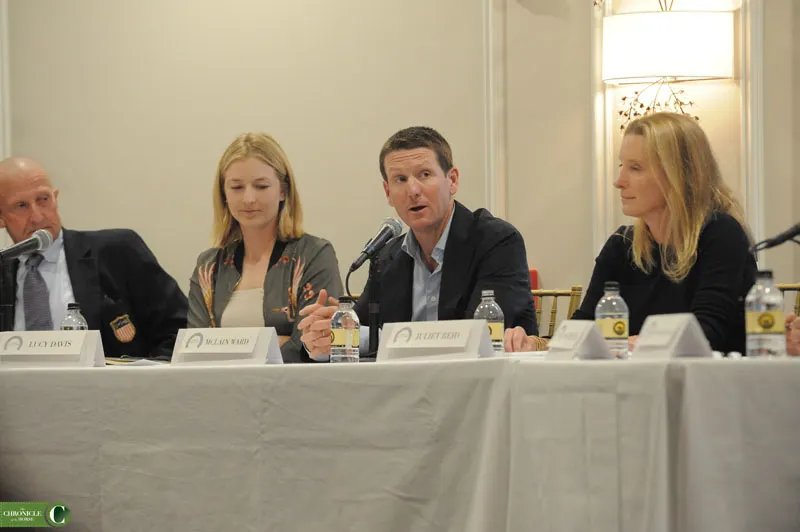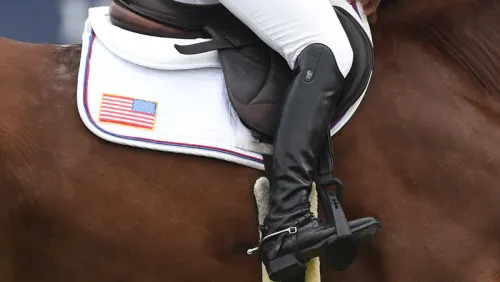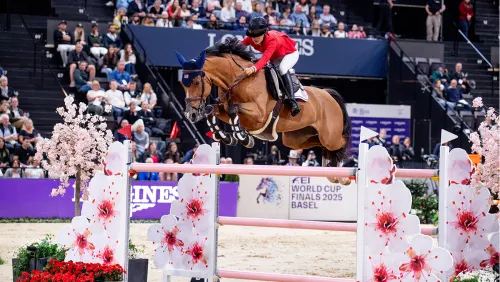Wellington, Florida- March 27
If you could sit down and discus top show jumping sport with any top equestrian, who would you pick? McLain Ward? Ian Millar? George Morris? What if you could sit down with all three and more?
That was the thought process behind “Jumping Into The Future: A Panel Discussion About Our Top Sport.” In just over a week organizer Cesar Hirsch pulled together a panel of top riders, trainers and course designers at the Wanderer’s Club in Wellington, Florida, to discuss the future of show jumping.
“I’ve been involved with the sport all my life,” said Hirsch, a Venezuelan born Fédération Equestre Internationale steward and judge. “I wanted the chance to have a good and interesting conversation with riders, trainers, officials, course designers—and I think that there is a lot of information out there, and we can have a good discussion for the good of the sport.”
Joining Ward, Morris and Millar were young Olympian Lucy Davis, Live Oak show organizer Juliet Reid, trainer Max Amaya of Stonehenge stables, and course designers Leopoldo Palacios and Guilherme Jorge. The event was open to the public and livestreamed on COTH TV, and about a hundred people attended in person, including John and Beezie Madden, Anne Kursinski, Christine Traurig, Peter Leone, Andrew Ramsay, the Deslauriers family, Daniel Bluman, Jimmy Torano, Tom Brennan and Michael Stone.
The panel ran for two hours and covered a series of topics with a question-and-answer session at the close. The topics addressed were development of the sport, CSI five-star and Nations Cups classes, course designing, and the commercial side of the sport.
One of the overarching themes throughout the discussion was elitism in the sport. It came up numerous times throughout the session, and five-star Israeli rider Bluman addressed it directly at the end.
“Are there realistic chances or opportunities for a middle-class 12-year-old in this country to pursue show jumping?” Bluman asked. “Or has this sport in North America become something that is out of reach for kids who aren’t really well off? Do you think that’s affecting our sport in North America because we don’t have that fan base?”
Ward took a stab at addressing Bluman’s query.
“I wouldn’t want to be quoted as saying all 25, but I would say almost all of the top 25 in the world right now come from a middle class or lower background,” Ward said. “Did they have opportunities? Absolutely. And I have said before riders that come from affluent backgrounds, that doesn’t determine their ability level or their potential.”
Bluman, who is friends with Ward and stays at his farm for part of the season, doubled down on his question and asked Ward to specifically address the issue of young riders coming up in the sport.
ADVERTISEMENT
“I think the same conversation took place 15 years ago,” Ward said. “It may be more extreme now because the price of horses has gotten much higher, and the sport has certainly grown in expense, but the same could be said for a person who wants to be a Formula One driver. How is he going to get noticed by Ferrari? He’s got to market himself. So yeah I absolutely think there is an opportunity. Is it easy? No, absolutely not, but nothing worth it is.”
Course design was also discussed at some length. Morris talked about how the tradition of course design has been passed over in modern sport and how fences in the jumper ring now all look very similar.
“The intention of the sport was to bring the country to the arena, that is that people that rode across the country wanted competitions against their friends—or enemies,” Morris joked. “They wanted to see who had the best horse, and now the intention of bringing the country to the arena, that’s gone. That doesn’t exist.
“The FEI for years the first page of their jumping book said, ‘At all costs protect variety,’ ” Morris continued. “That is gone. Gone. It is called protectionism. I understand protectionism, and it’s about space and time. We don’t have the time and space we used to have. It’s expensive for show managers to protect variety.”
Ward took the opposite view regarding modern course design.
“I’m going to defend my generation of riders,” Ward said. “I am a student of the sport and obviously through my parents and watching videos, actually today I was showing Samuel Parot a video from the 1983 American Invitational. The triple combination, it was an open faced liverpool, triple bar, oxer, and it was a video of my father, and he hit all of the top poles on the fences as hard as you can imagine, but they stayed up.
“For sure the fences have trees in them, and they were older, and they had 16-foot rails, but what has also changed is that you could attack those fences,” Ward continued. “You could ride the horse at the jump, and the fence held them off. It wasn’t a rub class. I have to say I think it shows a progression in the sport that has gotten better and more difficult because the jumps are big and wide, but now you can’t ride at them at all. They’re rub fences.”
Another major topic was the five-star system. Ward talked about the growth in this level of class and the number of five-stars offered.
“We’ve come to a point now where there has to be another category,” Ward said. “I don’t think a five-star every week is of the same level. Leopoldo builds some 1.70-meter fences [in Wellington], and that’s obviously a far more difficult class than a five-star in February in Ocala, quite a bit more difficult to be honest.
“There almost needs to be a super league or, as you see in tennis and golf, the majors,” Ward continued. “There’s a place for that in our sport where you take four to six major events a year where you can target and pinpoint those events with a top horse and a top athlete.”

McLain Ward (second from right) addresses the crowd at the panel discussion. Other participants pictured include (from left) George Morris, Lucy Davis and Juliet Reid.
The subject of Nations Cup competitions and team versus individual sport followed the five-star discussion, with Millar and Morris weighing in heavily.
ADVERTISEMENT
“I’m very much a Nations Cup rider; that’s probably more interesting to me than a grand prix,” Millar said. “Just the camaraderie that comes from when you ride with riders on a Nations Cup team; a very special bond forms. It’s so rewarding being involved in that, and we need Nations Cups at all the levels, because how else are you going to learn to ride on a Nations Cup team?”
“That was always the center piece of the show, and as a chef d’equipe I loved the Nations Cup,” Morris said. “The grand prix was the icing on the cake after the Nations Cup. I’m a Nations Cup person. I think the sport is going forward as an individual sport with Nations Cups, not as it used to be in my day where they were Nations Cup teams that at the end of the show did the grand prix. I think it swapped. Which I think is OK, but I very much do believe in protecting and enhancing and doing whatever we can to preserve the Nations Cup.”
The other major topic of discussion was promoting the sport to the general public. Lucy Davis took the lead on that front, advocating for a strong social media presence among top riders.
“As the token millennial on the panel,” Davis said with a grin, “I see the most potential in how we represent our sport to the global community and how we promote it to better educate people about our athletes and our events and really use social media and modern technology to get more people involved and keep younger people engaged over time. I think that will really help our events and our riders continue to grow.”
At the beginning of the event, Hirsch addressed the crowd and panelists reminding them that no governing body like the FEI or U.S. Equestrian Federation was sponsoring the discussion, and they could feel free to discuss any topic without “political correctness.” The event wrapped up with John Madden standing up from the crowd to take the mic as a representative of the FEI.
“I just want to reflect that this discussion is very valuable,” Madden said. “The president of the FEI asked me to attend and report back to him. I took notes on all the comments that were made, and I think we can take it as a very positive that many of the things discussed are very similar and already being worked on in a lot of ways.
“It’s not controversial. It’s reinforcing efforts the FEI is making,” Madden continued. “The FEI can’t do it themselves; they need all of your help.”
“I did this because I’m passionate about the sport,” Hirsch said in an interview after the event. “The FEI does its own forum. I think it all adds up to the benefit of the sport, but I don’t think we need to be affiliated with an organization to come up with these ideas.”
Hirsch hopes to have more of these forums at other shows throughout the year.



















